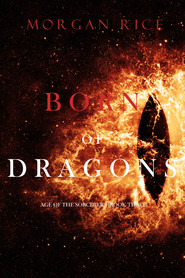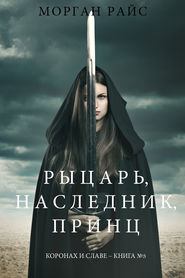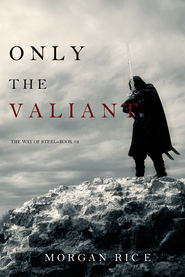По всем вопросам обращайтесь на: info@litportal.ru
(©) 2003-2024.
✖
Only the Worthy
Настройки чтения
Размер шрифта
Высота строк
Поля
She took his hand, and together, they stepped up toward the window. He turned and looked back, saw the knights closing in, and suddenly, before he had time to think through how crazy this was, he felt his hand yanked – and they were airborne.
Genevieve was even braver than he. She always had been, even as kids, he recalled.
They jumped, falling a good thirty feet through the air, Royce’s stomach in his throat, Genevieve shrieking, as they aimed for the wagon. Royce braced himself to die, and was grateful that he would not die, at least, at the hands of the nobles – and with his love at his side.
To Royce’s immense relief they landed in the pile of hay. It shot up in a huge cloud around them as they did, and while he was winded and bruised from the fall, to his amazement, he did not break anything. He sat up immediately and looked over to see if Genevieve was okay; she lay there in a daze, but she, too, sat up, and as she brushed off the hay, he saw with immense relief that she was unhurt.
Without a word they both at the same time remembered their predicament and jumped from the cart, Royce taking her hand. Royce ran to his horse, still awaiting him in the courtyard, mounted it, grabbed Genevieve, and helped her up behind him. With a kick the two of them took off at a gallop, Royce aiming for the open gate to the castle, as knights continued to flood in, racing past them, not even realizing it was them.
They neared the open gate and Royce’s heart pounded in his chest; they were so close. All they had to do was clear it, and with a few strides they would be out in the open countryside. From there they could rally with his brothers, his cousins, and men, and together, they could all flee from this place, and start life anew somewhere. Or better yet, they could amass their own army and fight these nobles once and for all. For one glorious moment time stood still, as Royce felt himself on the precipice of change, of victory, of everything he had known being turned upside down. The day for revolt had come. The day for their lives to never be the same again.
As Royce neared the gate, his veins filled with cold dread as he watched the portcullis, open again to let knights in, suddenly lowered, slamming shut before him. His horse reared, and they stopped short.
Royce turned around, looking back into the courtyard. There he saw fifty knights, now realizing who they were, closing in. Royce prepared to ride forward, to meet them in battle, however foolhardy it was, when suddenly, he felt a rope landing on him from behind, and heard Genevieve cry out.
The ropes tightened around his waist, and with a jerk, Royce felt himself thrown backwards from his horse. He landed on the ground hard, winded, bound from behind. He looked over and saw Genevieve bound by ropes, too, also yanked to the ground.
Royce rolled and stumbled, frantically trying to break free, the ropes tight around his arms and shoulders. He reached down to his waist, grabbed his dagger, and with one jerk, managed to cut them loose.
Free, he rolled out of the way of a club as it came down for his head. He reached out and grabbed his attacker’s sword, and then he wheeled, standing in the center of the courtyard, surrounded by what was now nearly a hundred knights. They closed in on him from all sides.
They charged. Royce raised his sword and fought back, defending as they slashed, slashing back himself, feeling invincible, stronger and faster than all of them. Still, they closed in tighter and tighter, their ranks growing thicker.
Royce raised his sword and blocked a blow aimed for his head; he then spun and slashed at another sword aiming for his back, and slashed up and knocked the sword from his attacker’s hands. He then leaned back and kicked another knight in the chest as he neared, forcing him to drop his club.
Royce fought like a man possessed, slashing and parrying, managing to keep dozens of them at bay, as swords clanged and sparks showered down all around him. He breathed hard, barely able to see from the sweat stinging his eyes. And all the while he thought of only one thing: Genevieve. He would die here for her.
The ranks thickened even more, and soon, it was too much even for him. Royce’s arms and shoulders ached, his breathing grew heavy, as he found the crowd so thick, so close, that he could barely maneuver to swing. He raised his sword one last time to slash, when suddenly, he felt an awful pain in the back of his head.
He dropped to the ground, dimly aware he had been clubbed. The next thing he knew he was lying sideways on the ground, unable to move, as dozens of knights pounced on him. It was a wall of metal pinning him to the ground, bending his arms, knees in his back, arms on his head.
It was over, he realized.
He had lost.
CHAPTER SIX
Royce woke, startled, to the feeling of ice water on his face, to the sounds of shouts and jeers, and he squinted in the light. One of his eyes, he realized right away, was sealed shut, the other barely open, just enough for him to see by. His head reeled from the pain, his body stiff, covered in lumps and bruises, and he felt as if he had been rolled down a mountain. He looked out at the world before him, and wished he hadn’t.
A bustling mob encircled him, some shouting and jeering, others protesting, seemingly on his behalf. It was as though these people had erupted in civil war, he in the center. He struggled to make sense of what he saw. Was this, he wondered, a dream?
The pain was too intense for this to be a dream; the stabbing headache, the coarse ropes digging into his wrists. He struggled, to no avail, at the ropes binding his wrists and ankles and looked down to realize he was tied to a stake. His heart pounded to see a pile of wood beneath him, as if ready to be lit. Fear crept over him as he realized he was strung up in the castle courtyard.
Royce looked out and saw hundreds of villagers swarming into the courtyard, saw dozens of knights and guards standing along the walls; he saw a makeshift wooden stage, perhaps fifty feet away, and on it, tribunal judges, all nobles. In the center sat a man he recognized: Lord Nors. The head of the nobles’ family. Manfor’s father. He was the presiding judge of the countryside. And he sat in the center and stared down at Royce with a hatred unlike any Royce had seen.
It did not bode well.
All of it came rushing back to Royce. Genevieve. Breaking into the fort. Rescuing her. Killing Manfor. Jumping. Fighting off those knights. And then…
There came the slamming of a hammer on wood several times, and the crowd quieted. Lord Nors stood, glowering down at all, and he was even more fierce, more commanding, standing. He set his fury-filled eyes on Royce and Royce realized he was being put on trial. He had seen several trials before, and none had gone well for the prisoners.
Royce scanned the faces, desperate to find any glimpse of Genevieve, praying she was safe, away from all this.
Yet he found none. That was what worried him most of all. Had she been imprisoned? Killed?
He tried to block out various nightmare scenarios from his mind.
“You hereby stand accused of the murder of Manfor of the House of Nors, son of Lord Nors, ruler of the South and the Woods of Segall,” Lord Nors boomed out, and the crowd grew completely still. “What is your plea?”
Royce opened his mouth, struggled to speak – but his lips and throat were parched. His voice fell short, and he tried again.
“He stole my bride,” Royce finally managed to reply.
There came a chorus of supportive cheers, and Royce looked out to see thousands of villagers, his countrymen, pouring in, wielding clubs and sickles and pitchforks. His heart leapt with hope and gratitude as he realized all his people had come to support him. They had all had enough.
Royce looked up at Lord Nors and saw him lose his conviction, just a touch. A nervous look spread across his face as he turned and looked to his fellow judges and they looked to the knights. It seemed as if they were beginning to realize that they might, if they condemned Royce to death, have a revolution on their hands.
Finally, Lord Nors slammed his hammer, and the crowd quieted.
“And yet,” he boomed, “the law is clear: any peasant woman is the property of any noble until she is wed.”
There came a loud chorus of boos and hisses from the crowd, and the mob surged forward. An anonymous person hurled a tomato toward the stage, and the crowd cheered, as it barely missed Lord Nors.
There came a horrified gasp amongst the nobles, and as Lord Nors nodded, the knights began to push into the crowd, eager to find the offender. Yet they soon stopped and thought better of it as they were swarmed by hundreds more villagers bustling into the square, making passage impossible. One knight attempted to elbow his way forward, but he soon found himself completely engulfed by the masses, shoved every which way, and amidst angry shouts and cheers, he backed away.
The crowd cheered. Finally, they were standing up for themselves.
Royce felt a surge of optimism. A turning point had arrived. All the peasants, like he, had had enough. No one wanted their women taken anymore. No one wanted to be thought of as property. All of them realized that they could be in Royce’s position.
Royce scanned the mob, still desperate to find Genevieve – and his heart suddenly leapt as he spotted her at the edge of the courtyard, she, bound in ropes. Nearby stood his three brothers, they, too, bound as well. He was relieved to see that at least they were alive, and uninjured. But upset to see them bound. He wondered what would become of them, and he wished more than anything that he could take their punishment for them.
As the crowd swelled, the magistrates looked more nervous than before, and they looked to Lord Nors with uncertain glances.
“It is your law!” Royce called out, finding his voice, emboldened. “Not ours!”
The crowd let out an enormous roar of approval, as it surged forward dangerously, pitchforks and sickles raised high in the air.
Lord Nors, scowling back down at Royce, held up his hands, and the crowd finally quieted.
“My son is dead on this day,” he boomed, his voice heavy with grief. “And if I were to uphold the law, you would be killed, too.”
The crowd booed and swarmed threateningly.
“And yet,” Lord Nors boomed, raising his hands, “given the situation of our times, killing you would not be in the best interests of the crown. And thus,” he said, turning and looking to his fellow magistrates, “I have decided to grant you mercy!”

















